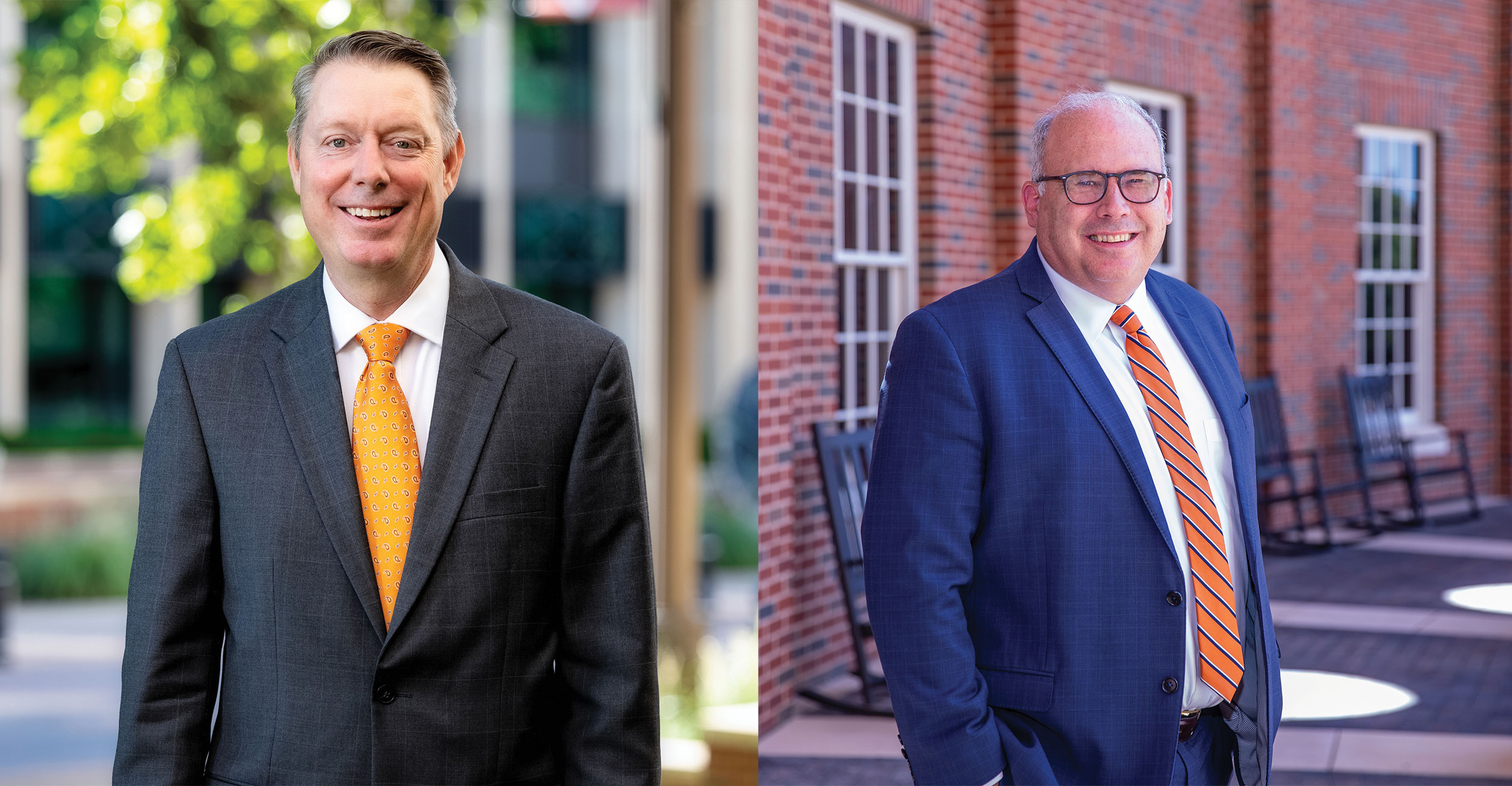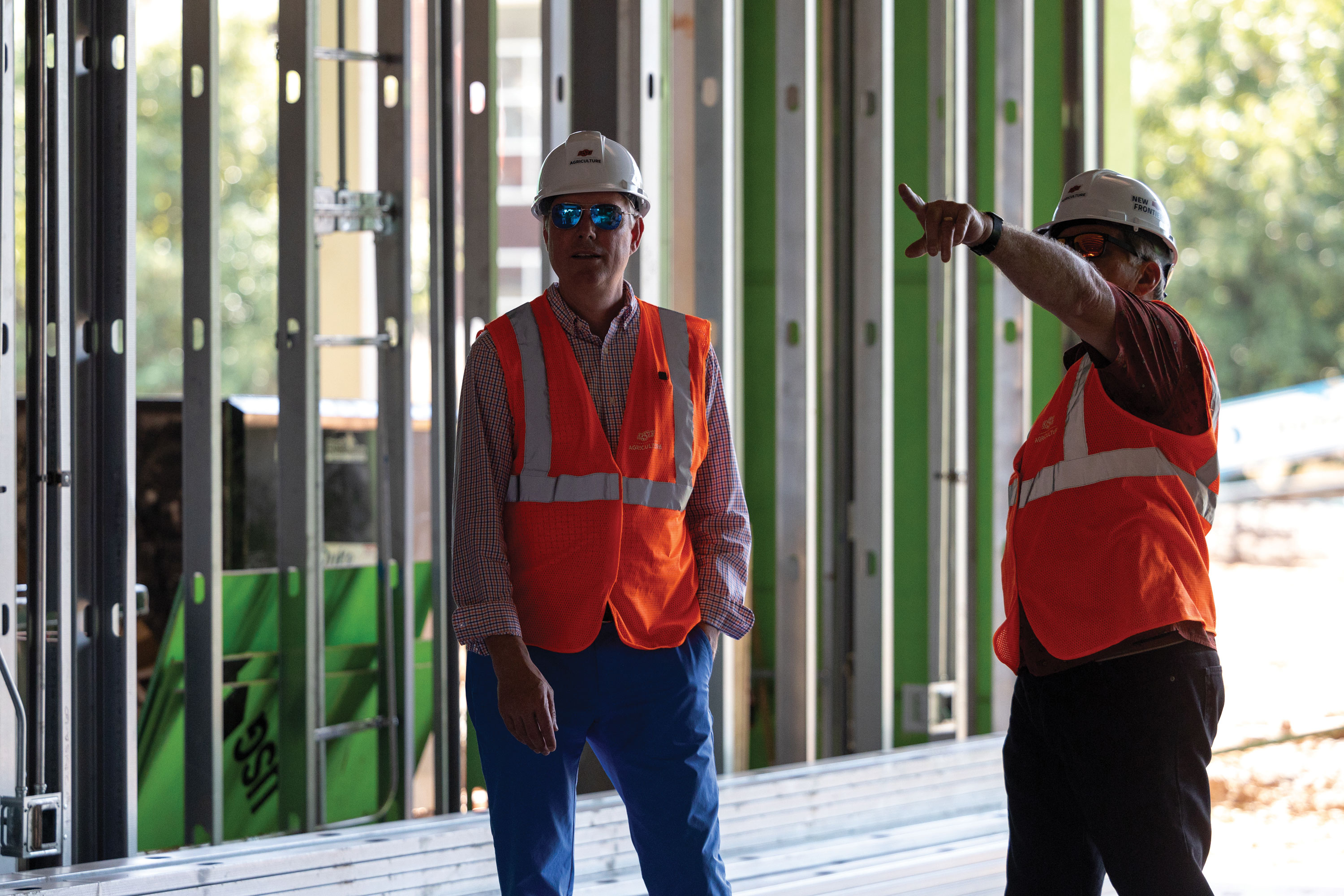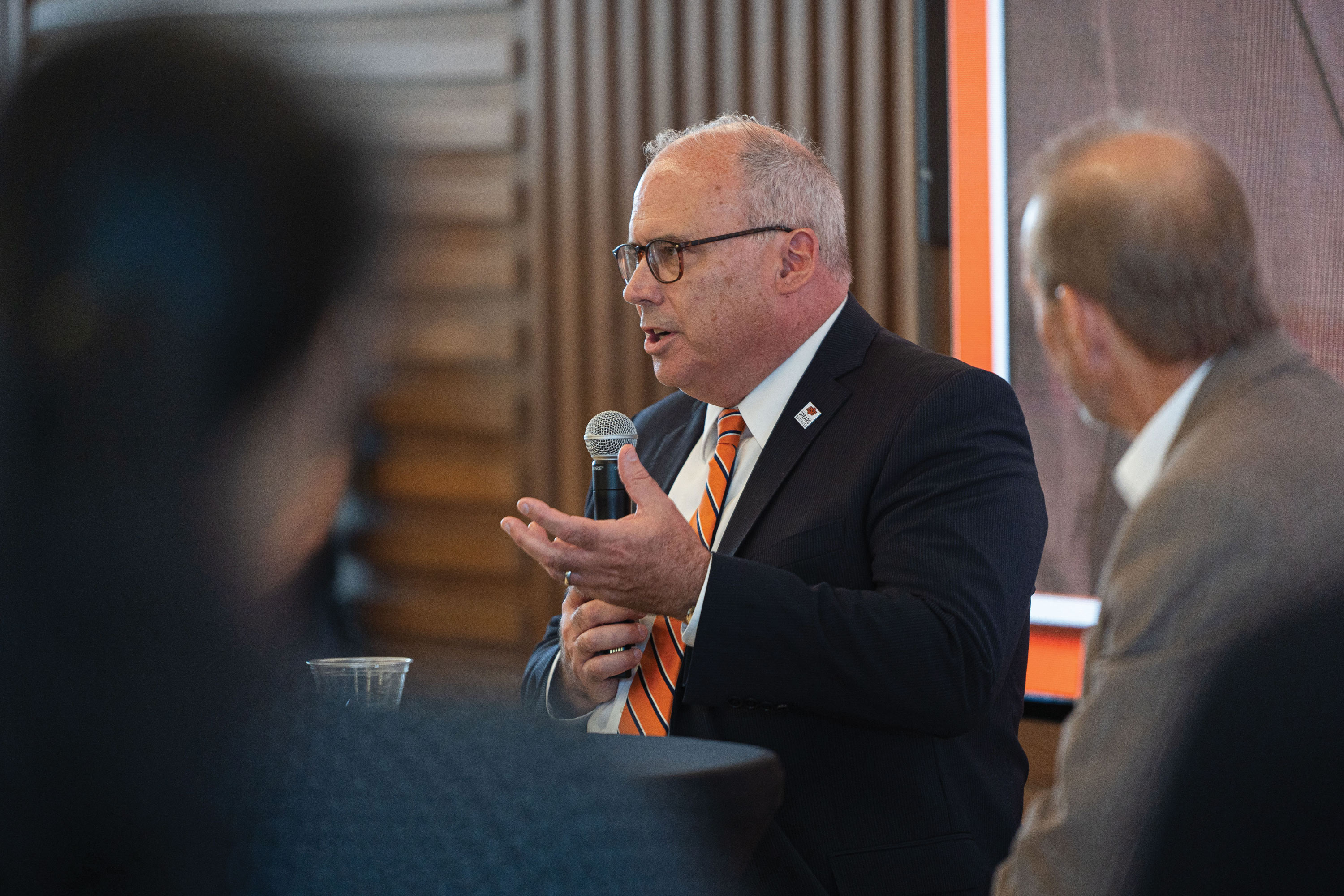
New deans for OSU Agriculture, Business speak on their vision for the future
Thursday, December 21, 2023
Media Contact: Mack Burke | Associate Director of Media Relations | 405-744-5540 | editor@okstate.edu
Jayson Lusk — Ferguson College of Agriculture

Dr. Jayson L. Lusk has returned to the Cowboy family as Oklahoma State University’s vice president and dean of the Division of Agricultural Sciences and Natural Resources.
Lusk worked at OSU from 2005-17, first as an agricultural economics professor and Willard Sparks Endowed Chair and then as a regents professor. Since 2017, he served Purdue University as a distinguished professor and head of the Agricultural Economics Department.
STATE magazine sat down with Lusk to discuss his role and the upcoming move of OSU Agriculture into New Frontiers Agricultural Hall in 2024.
Given your expertise in food and crop development, what are some emerging areas of research grabbing your attention?
There are so many tremendous opportunities in the food and agriculture space. It’s hard to pick just one or two. One example is the ability to collect an incredible amount of data about farming and food production and translate it into management decisions. For example, using drones and geofencing technologies to track animal movements can help predict disease and, as a result, inform solutions. Another example is using technologies to get a more accurate picture of soil fertility and water levels, so producers can make better decisions for crop efficiencies. These technologies are not new, but they are emerging in ways that we can create tools to be used by farmers to enhance their operations.
Oklahoma State has expertise in plant and crop breeding. Genetic knowledge and our ability to make more precise breeding decisions have evolved quickly during the last decade. Identifying more disease-resistant crop varieties that are also drought tolerant or have better qualities for consumers — these are big wins, and we can do them much more rapidly than in the past.
What are some research opportunities of note here at OSU?
OSU Agriculture invests in research opportunities for students, faculty and staff. These research activities occur at more than 40 facilities across the state, taking advantage of the geographic and environmental diversity that Oklahoma offers. In Stillwater, for example, applied research takes place on the Agronomy Farm and at The Botanic Garden on the west perimeter of campus, as well as at several livestock facilities and of course, in traditional research laboratories.
For context, some of the university’s earliest research began in 1892 and continues to this day at the experimental winter wheat field plots named after A.C. Magruder, our very first professor of agriculture. It is among the oldest research of its kind in the United States. That speaks volumes about our commitment to agricultural research and our land-grant mission.
Whether you’re an undergraduate student or a graduate student, there’s no shortage of opportunities, but I would certainly like those to grow. One of my ambitions is to secure more resources, so we can do even bigger and better things on the research front to address society’s greatest challenges.
How do you think OSU is positioned to address its goal of helping to feed the world?
Oklahoma producers grow important, foundational crops that already help address food insecurity and hunger. For example, we are a top wheat-producing state. About half of the wheat in any given year is exported to other countries, often to places where food insecurity rates are high. Our scientists’ academic, research and Extension efforts serve Oklahoma and stretch far beyond the state. OSU is ranked seventh in the world in Zero Hunger, which addresses global food security as part of the United Nations’ Sustainable Development Goals. There is more work to do, but I’m confident our faculty, students and Extension educators are ready for the challenge.
How do you think New Frontiers Agricultural Hall will benefit not only OSU Agriculture but OSU as a whole?
New Frontiers Agricultural Hall is going to help us recruit the next generation of students and get them interested in food and agriculture. The new building will be a place students will walk through on their way to classes, hang out at the Dairy Bar or find a huddle room and study. This is an opportunity to showcase what we do in agriculture.
Currently, the research facilities our scientists have access to are World War II-era technology. In some ways, it’s amazing they’ve been able to make the advances they have despite some of our antiquated lab space and technologies. The ability to move into state-of-the-art facilities will help us more rapidly achieve our strategic priorities and recruit talented students and faculty.
Because your life’s work has centered around food, what are your favorite things to eat? Do you have a favorite meal?
I do like to eat; that’s true. One of my favorite things to do when we travel places is to visit a grocery store or tour farmers markets and food markets. I’m not a picky eater, which means I can be happy eating lots of different things, but if we were to have a group of people over, what would I cook? It would probably be brisket that I’ve smoked served with my wife’s spicy cheese grits. That’s our go-to dish when we have people over.
My interest in food goes back to cooking competitions in 4-H Youth Development. When I was a kid, my mom made my three siblings and I do jobs around the house. She always had us take a turn every month for at least one week to do the cooking, and it didn’t matter whether you were one of the guys or one of the girls. I can still remember to this day that my 4-H entry was beef stroganoff. I went to the regional competition and had to present and cook the recipe for judges. So, my interest in the food side of agriculture is something my mom instilled in me and has carried on throughout my life.
Jim Payne — Spears School of Business

Dr. Jim E. Payne brings a distinguished record of accomplishments in research to his new role as dean of the Spears School of Business at Oklahoma State University.
Previously the dean of the Woody L. Hunt College of Business and holder of the Paul L. Foster and Alejandra de la Vega Foster Distinguished Chair in International Business at the University of Texas at El Paso, Payne was named the dean of Spears Business in June.
STATE magazine sat down with Payne to discuss his role.
How is Spears Business working to elevate OSU’s positive impact across the state?
I think Spears Business is helping to elevate OSU in several ways. Right off the top, I think the academic programs themselves, given that many are nationally ranked, demonstrate the value added we provide to the citizens of Oklahoma. We have noted academic programs that are providing a quality education to our students, who then contribute to the workforce needs of our state and our region. In addition, some of our research is focused on specific areas pertinent to the economic development of the state. Our faculty produces impactful research that is contributing positively to industry. Also, our centers are doing quite a bit of outreach to different stakeholder groups within the state. So, I think those three areas show that we’re contributing and having a positive impact.
Why is Spears a crucial piece of the workforce pipeline in Oklahoma?
As a business school, we cut across every industry, ranging from hospitality and tourism to the oil and gas sector — really every industry sector within the state. That is exemplified by the placement of our students across all these different industries. I think the other thing we’re working on is also assisting with upskilling employees through certifications and professional development opportunities.
How is the Center for the Future of Work reimagining education?
At the Center for the Future of Work, they’re looking at the industry landscape 10 years down the road. We don’t know what jobs are going to look like in a decade, per se, because as technology advances, you’re going to see different types of jobs emerge and advance. So, the center is looking ahead trying to get a sense of what the future is going to look like and what skills are needed for that workforce. Then, the focus point is about how do we reach populations that were traditionally underserved by education at some level? So, it goes back to upskilling. I think they are adept at doing custom programs based on industry need. They also do executive coaching, and the training platforms can be face-to-face or online, and they offer different certifications that are needed in industry as well.
One of the things that sets Spears Business apart is the cocurricular activities for students. How can they help shape the next generation of leaders in our state?
Spears Business has a student organization or competition for every student, and they all provide an avenue to leadership, team building and networking skills. I also think it’s important that they get to meet and work alongside students with different perspectives and backgrounds from their own, because that’s what happens in the real world. The cocurricular opportunities here provide a more well-rounded education for the student in those facets.
Tell us about your journey from first-generation student to dean?
For me, having an opportunity to go to college was the first step, but then having good mentors along the way made the biggest difference in my journey. I had an undergraduate advisor who I still keep in touch with. He got me started in economics. He was instrumental in sharing with me opportunities to go to grad school and how to finance it, because I had no clue. I also had fantastic guidance from faculty members along the way, which helped me take the next step. Then, at different points in your life, you run into people that either you respect or value what they’ve accomplished, and you look at them as more of a role model, a mentor. I think that’s true for everybody, and that’s how I progressed over my career. I also had really good support from my parents, even though they didn’t go to college, and I think that was key.
Photos by: Mitchell Alcala, Aaron Murphy and Devin Flores
Story by: Mandy Gross and Stephen Howard | STATE Magazine
